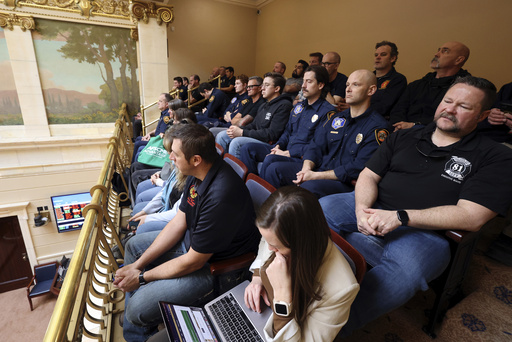
SALT LAKE CITY — A significant shift in labor rights occurred in Utah as legislation prohibiting collective bargaining for various public sector workers, including teachers, firefighters, and police officers, received final approval from the state legislature on Thursday. The Republican-backed measure, which had already passed the House, was confirmed in the Senate with a vote of 16-13 after attempts to negotiate a compromise were ultimately abandoned.
Sen. Kirk Cullimore, who sponsored the bill in the Senate, commented, “If there’s not going to be consensus, then let’s just run it on its face.” The legislation has raised concerns among labor experts, who predict that it could create some of the strictest labor regulations in the nation. This drastic step seems aimed at diminishing the political clout of teachers’ unions in the state.
The backdrop for this legislation intersects with national developments, particularly as President Donald Trump is preparing significant cuts to the U.S. Education Department. These actions could lead to reduced funding and force many education staff to leave their positions, complicating support for public education.
In Utah, public educators are predominantly reliant on collective bargaining, viewing this legislation as a direct threat to their ability to organize. Teachers’ unions in the state have heavily criticized recent Republican initiatives targeting diversity initiatives, enhancing school choice through vouchers, and limiting transgender participation in school sports and bathroom usage.
While the new law permits state employees to maintain union membership, it strips those unions of the ability to negotiate wages and workplace conditions on their behalf. The state’s governor, Spencer Cox, has not publicly revealed whether he intends to sign the bill into law or issue a veto. His spokesperson, Robert Carroll, noted that the governor will carefully consider the matter now that it has progressed through the legislature.
In light of this legislation, the Utah Education Association, the largest union representing public education workers in the state, has urged Governor Cox to demonstrate his commitment to educators by vetoing the bill promptly. The measure was passed without veto-proof support; thus, should Cox choose to oppose it, Republicans would require additional backing to overturn the decision. Notably, all Senate Democrats and seven Republicans were against the bill during the vote.
Supporters of the legislation, including Cullimore and Rep. Jordan Teuscher, argued that collective bargaining agreements often hinder workers’ direct involvement in contractual discussions, suggesting that removing the intermediary allows for more direct dialogue between employees and employers regarding workplace issues. Some conservative educators shared similar sentiments during legislative hearings, arguing that the balance of negotiating power should not rest solely with left-leaning unions.
Cullimore defended the proposition, asserting, “This bill is not anti-union or anti-teacher. We have passed measures to improve teacher pay, particularly when local entities or the union have failed to do so.” If enacted, Utah would join ranks with states like North Carolina and South Carolina, known for their stringent regulations against public sector unions.
The implications of this legislation have not gone unnoticed by critics. Democratic Sen. Kathleen Riebe expressed her concerns, stating, “This bill turns a civil servant into an indentured servant.” Riebe emphasized the vital roles that public servants play in the community and urged fellow legislators not to approve the measure.
Opposition from first responders manifested vividly during the discussions. Firefighter Jack Tidrow, who has been a vocal opponent at the legislature, highlighted the essential role of unions in maintaining safety standards for firefighters. He asserted that the current environment has become “less safe” for workers following the Senate’s approval of the bill.

